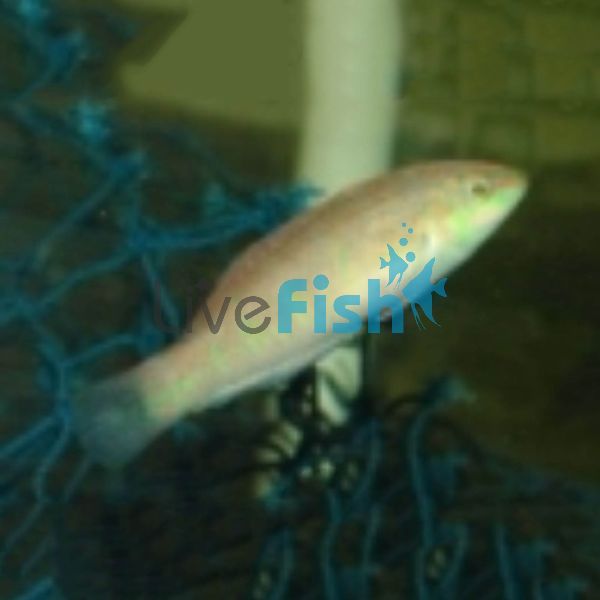Nebulosus Wrasse - Medium
The Nebulous Wrasse is peaceful, attractive, and is great for beginners. It isn't common in the marine trade, but if you spot one it will a great addition to an aquarium.
Nebulous Wrasse
The Nebulous Wrasse displays a variety of colours and patterns for camouflage. Usually, the colours range between mottled browns and dark greens. This species can be distinguished by the dorsal fin which has an eyespot (ocelli) in the middle. Males can be identified by the pink band under the eye. Females have a pink patch on the stomach. ,
Nebulous Wrasse are protogynous hermaphrodites. The young are born as females, with the ability to change sex. Males aren't as common, with a social group often consists of a single male and a harem of females. The males have a pink band under the eye. Females have a pink patch on the stomach. , There isn't a lot of information about breeding habits. However, attempts in home aquariums have proved unsuccessful.
The Nebulous Wrasse originates from Sri Lanka. It can be found in Indo-West Pacific regions, including the Red Sea. It inhabits areas of rocky or coral reefs and reef flats, usually between depths of 1-40 metres.
Tank Recommendations for your Nebulous Wrasse
Tank size needs to be at least 90 gallons (340.7 litres) capacity.
The Nebulous Wrasse is generally a reef safe species. It will consume benthic invertebrates, including pests such as Flatworms and Nudibranches. However, this means avoiding keeping ornamental invertebrates such as snails, shrimps, or fan worms. A suitable tank should have an open area with a sand bed that is at least 4 inches deep. It will burrow into the sand at night for sleeping, or if it is frightened.
There should also be rocky areas, including live rock for feeding. The Nebulous Wrasse has reputation for jumping so a secure cover is recommended.
Suitable Tank Buddies
This is a peaceful species of Wrasse and its tank buddies should have a similar temperament.
It is known to clean other fish in the aquarium, but this shouldn't be misinterpreted as aggression.
Usually Compatible
Docile species such as Firefish, Fairy Wrasse, and Flasher Wrasse are suitable.
Sometime Compatible
A pair or group of conspecifics are fine in a larger tank as long as they are introduced together. Any group should only contain one male. There is a possibility it may bother smaller fish that are introduced after it. Caution is advised with Frogfish, Eels, Groupers, and Triggerfish.
Rarely Compatible
Avoid aggressive predators that are big enough to eat it, such as Sharks and Rays. Small invertebrates are unsuitable as the Nebulous Wrasse may hunt and eat them.
Feeding your Nebulous Wrasse
The Nebulous Wrasse is a carnivore. It will consume pyramidellid snails and fireworms, helping to protect clams and corals. However, larger specimens will also eat ornamental inverts such as crabs and shrimp. A suitable diet should include a variety of meaty foods. Vitamin enriched mysis and brine shrimp are great options. krill, squid, prawns, food flakes, and pellets, are also popular choices. Feeding should take place several times per day.
| Scientific Name | Halichoeres nebulosus |
|---|---|
| Care Level | Moderate |
| Common Names | Nebulous Wrasse, Nebulous Rainbowfish, Sand-reef Wrasse Picture Wrasse, Picture Rainbowfish, Circle-cheek Wrasse, Circle-cheek Rainbowfish, Clouded Rainbowfish, Clouded Wrasse, Pinkbelly Wrasse, Pinkbelly Rainbowfish. |
| Diet | Carnivore |
| Fish Family | Labridae |
| Max. Length (cm) | 13 |
| Min. Tank Volume (l) | 341 |
| Origin | Indo-West Pacific; the Red Sea, Sri Lanka. |
| Reef Safe | Yes |
| Sociability | Peaceful |
| Venomous | No |
| Water Conditions | 24-28° C (75-82° F), dKH 8-12, pH 8.1-8.4, sg 1.020-1.025 |




